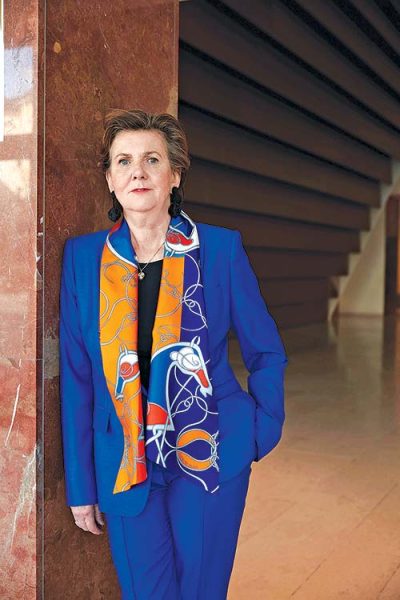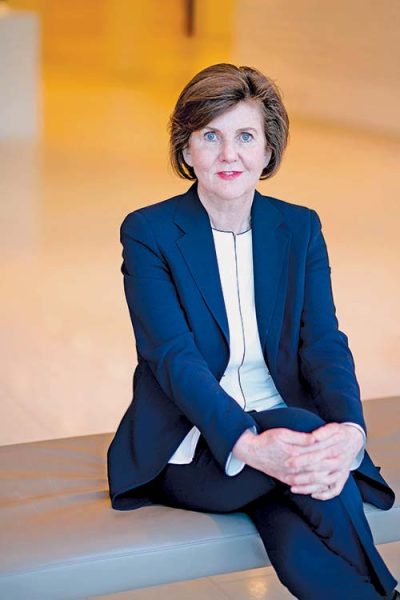Here Austria’s cultural visionary, Helga Rabl-Stadler, offers her thoughts on how Austria could help shape our world through art and diplomacy, as well as discussing how artists and scientists from Austria and Serbia might come up with solutions for the future
In 2021 came an announcement that was sad news for many in the world of music and culture: Helga Rabl-Stadler, president of the Salzburg Festival since 1995, declared that this would be her final summer in the role. Rabl-Stadler, who hails from a prominent Austrian family and has a wealth of experience in journalism, politics and business, had become synonymous with the festival over the past 27 years, running the operation successfully with a budget of approximately 65 million euros for about 200 opera, concert and drama performances. As the New York Times wrote that year, her amiable but no-nonsense presence has served as a reassuring sign of stability, and many would have been happy for her to stay on.
However, Rabl-Stadler felt that it was time to step down and seek new venues of engagement. After all, she had proven equally successful in many different occupations prior to taking on the presidency of the Salzburg Festival. We used this CorD Magazine interview to discuss Helga’s long and distinguished career, but also to gauge her thoughts on her new role as a special adviser for foreign culture at the Austrian Ministry of Foreign Affairs.
There is a great danger that quick, simplified answers to complex problems are offered by populists from all countries, so it is essential to get people to think for themselves, to get out of their bubble and ask the right questions. Art can do that
Discussing her plans to strengthen Austria’s cultural presence abroad, including by focusing on human dignity and the role of art in solving complex problems, Rabl-Stadler also talks about her visit to Belgrade, during which she hopes to build a culture for the future together with artists and scientists from both Austria and Serbia. She also shares her views on the imaginative thinking required for new solutions, emphasising the importance of flexibility and togetherness, and the desire to help shape the future. She believes that art can offer orientation in a world that has become disjointed, and that it can help people think for themselves and ask the right questions.
You presided over the Salzburg Festival for 27 years. What was your motivation in joining the Austrian Ministry of Foreign Affairs as a special adviser for foreign culture and how does it feel to take on this new role?
Foreign Minister Schallenberg is aware that cultural policy is just as important for foreign policy as security policy. My mission is to make his attitude even more visible and effective. And that’s especially so in these times of war, when we want to, and must, strengthen the non-military tools of diplomacy.
How do you envisage the further development of Austria’s cultural presence abroad? What fresh perspectives do you intend to bring?
Hand in glove with the new Director General for cultural affairs at the Ministry of Foreign Affairs, Christoph Thun- Hohenstein, I want to make it clear that our great cultural past is not limited to musealisation, but can and should be the basis for overcoming today’s problems.
The title of our activities is “Imagine: Dignity” and includes human dignity, but also the dignity of nature as a whole. In connection with this concept, we have to rethink the future of our economic model.

Your responsibilities range from maintaining a dialogue with the science, art and culture scenes and civil society, to international cultural mediation in a traditional and innovative sense. Considering all of this, what should we expect to see during your visit to Belgrade?
At the Ministry of Foreign Affairs, we wholeheartedly support the EU accession of the Western Balkan countries. Belgrade, this lively city in which technology and digitalisation are not seen as a danger, but rightly as an opportunity, is a particularly important partner for our plans to together build a culture for the future.
“Together” is a word of utmost importance here: artists from Austria and Serbia, but also scientists from both countries, will show how much can be achieved through this cooperation. We will together prepare exhibitions of architecture, design and urban planning, and highlight the role of art for our times. We will together organise workshops in which outstanding representatives from all disciplines of art and science will come up with solutions for the future. It is important to us to motivate creative people in both countries to get involved in the design of the new models of life.
You have been quoted as saying that “art can and must offer orientation in our world that has become disjointed”. In that respect, how does the ailing of this world manifest itself and how could art provide a cure?
We live in a time of helplessness and aimlessness. Artists are often seismographs, because they feel the problems earlier than many others. There is a great danger that quick, simplified answers to complex problems are offered by populists from all countries, so it is essential to get people to think for themselves, to get out of their bubble and ask the right questions.
We are facing huge challenges, such as climate change and everything that follows, but also challenges to our democratic system, and many people have the dangerous impression that getting involved is pointless. We want to counteract this with a new generation of exhibitions designed to be participatory and consistently involving civil society
Art can do that. For example, when you watch the opera Elektra, you are confronted by all the great problems of our world: love and hate, loyalty and betrayal, war and peace, revenge and forgiveness.

And suddenly the question arises: is revenge strength or does true strength lie in the ability to forgive, in forgiveness? As festival president, I’ve seen hundreds of people discuss things for hours after an opera or a theatrical performance. Great Austrian conductor Nikolaus Harnoncourt said: ‘If we, the artists, are good, then people will be transformed when they go home from a performance’.
What makes Austria a suitable country to bring such change?
During its best times, Austria peacefully united different cultures, ethnic groups and religions under one roof. After World War I, the huge empire shrank to “the rest that remained”, as French Prime Minister Clemenceau put it, not charmingly, but unfortunately correctly. However, Austria has remained a great power culturally, which is no reason for us to rest on our laurels, but rather provides motivation to do new things. Cultural ties to the Balkans are particularly important to us in this regard.
Who or what are main sources of the imaginative thinking required today for new solutions? Is this still a human task or one that’s being taken over by the broad introduction of AI?
Flexibility, togetherness, the desire not to suffer the future, but to help shape it – these are the attitudes with which we can find new solutions. We are facing huge challenges, such as climate change and everything that follows, but also challenges to our democratic system, and many people have the dangerous impression that getting involved is pointless.
Belgrade, this lively city in which technology and digitalisation are not seen as a danger, but rather rightly as an opportunity, is a particularly important partner for our plans to together build a culture for the future
We want to counteract this with a new generation of exhibitions designed to be participatory and consistently involving civil society. Artificial Intelligence can help us with this, but it must be controlled by humans. The open questions here are: how do we deal with technologies; how can we merge technology, people and nature into a dignified life plan within a new digital humanism?
Austrian Foreign Minister Schallenberg praised you for showing “ground-breaking will to implement things”. What would you like to change first in your new role?
It is very important to me that art is not just decoration for everyday life. Great power lies within art – it can strengthen self-confidence and identity not just among individuals, but among entire countries. That is why culture and science must also play an even more important role in our diplomacy – I will not let up on that.
| DIPLOMACY Cultural policy is just as important for foreign policy as security policy. And that’s especially so in such times of war, when we want to, and must, strengthen the non-military tools of diplomacy | SOLUTIONS Flexibility, togetherness, the desire not to suffer the future, but to help shape it – these are the attitudes with which we can find new solutions | BALKANS Austria has remained a great power culturally, which is no reason for us to rest on our laurels, but provides motivation to do new things. Cultural ties to the Balkans are particularly important to us in this regard |
|---|